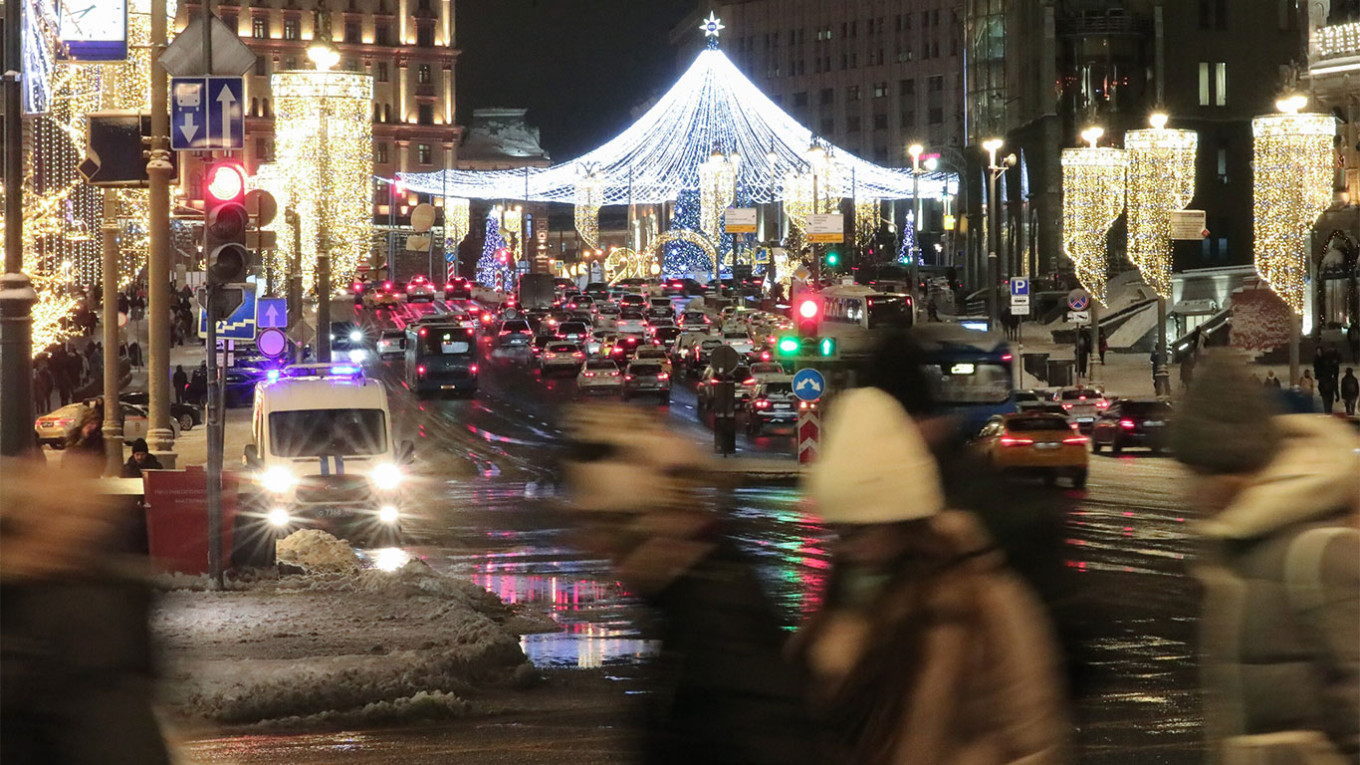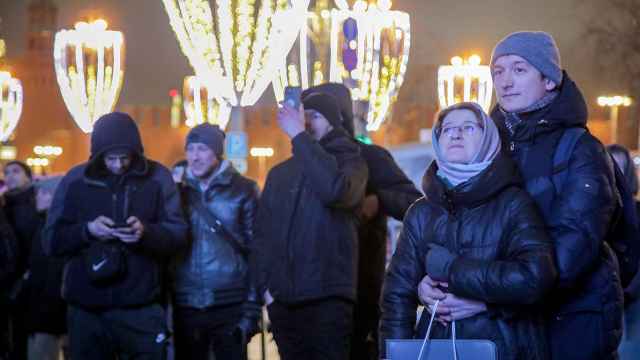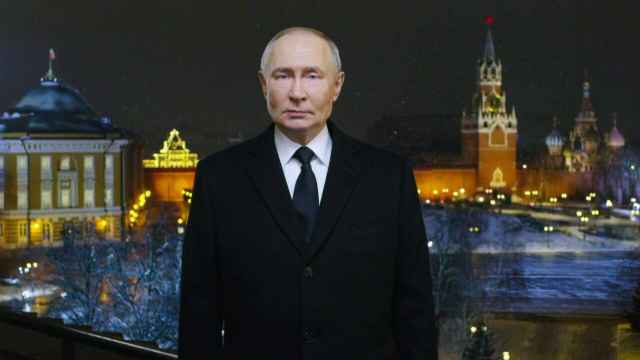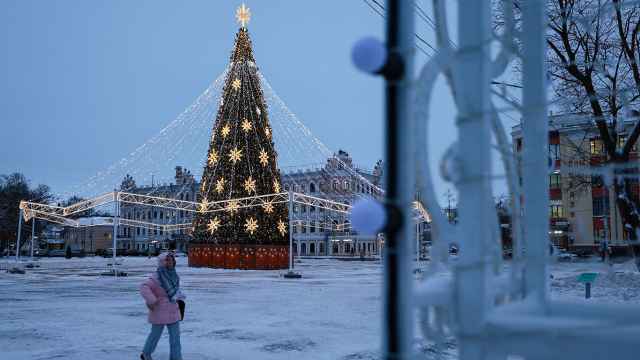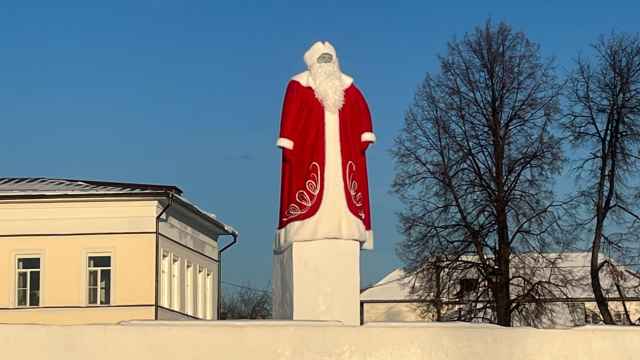As Russians prepare to mark their first New Year’s Eve since the start of the war in Ukraine that has claimed tens of thousands of lives and created unprecedented upheaval, the holiday season looks set to be a time of particular reflection and stock-taking.
From Russian soldiers in the trenches in Ukraine to anti-war activists who have fled abroad, few have any confidence they can predict what 2023 will bring.
Though the Kremlin has tried for months to minimize the impact of the war — which shows no sign of ending — the fallout is increasingly touching every aspect of life for ordinary people across the country.
Russian soldiers in Ukraine need no reminders about the scale or ferocity of the fighting that followed Putin’s ordering of tanks over the border in February.
“I hope that I will celebrate New Year’s in the very center of Kyiv, but I'm afraid that in reality, I will find myself in a dugout,” said one Russian officer in his twenties who is currently deployed near the village of Svatove in Ukraine’s Luhansk region.
“We even decorated some [of the dugouts] with Christmas trees,” he told The Moscow Times in an interview in late December, requesting anonymity.
Instead of the lightning victory anticipated by Putin’s generals, the fighting in Ukraine is now concentrated in the south and east of the country after a series of Ukrainian victories in the Kharkiv and Kherson regions.
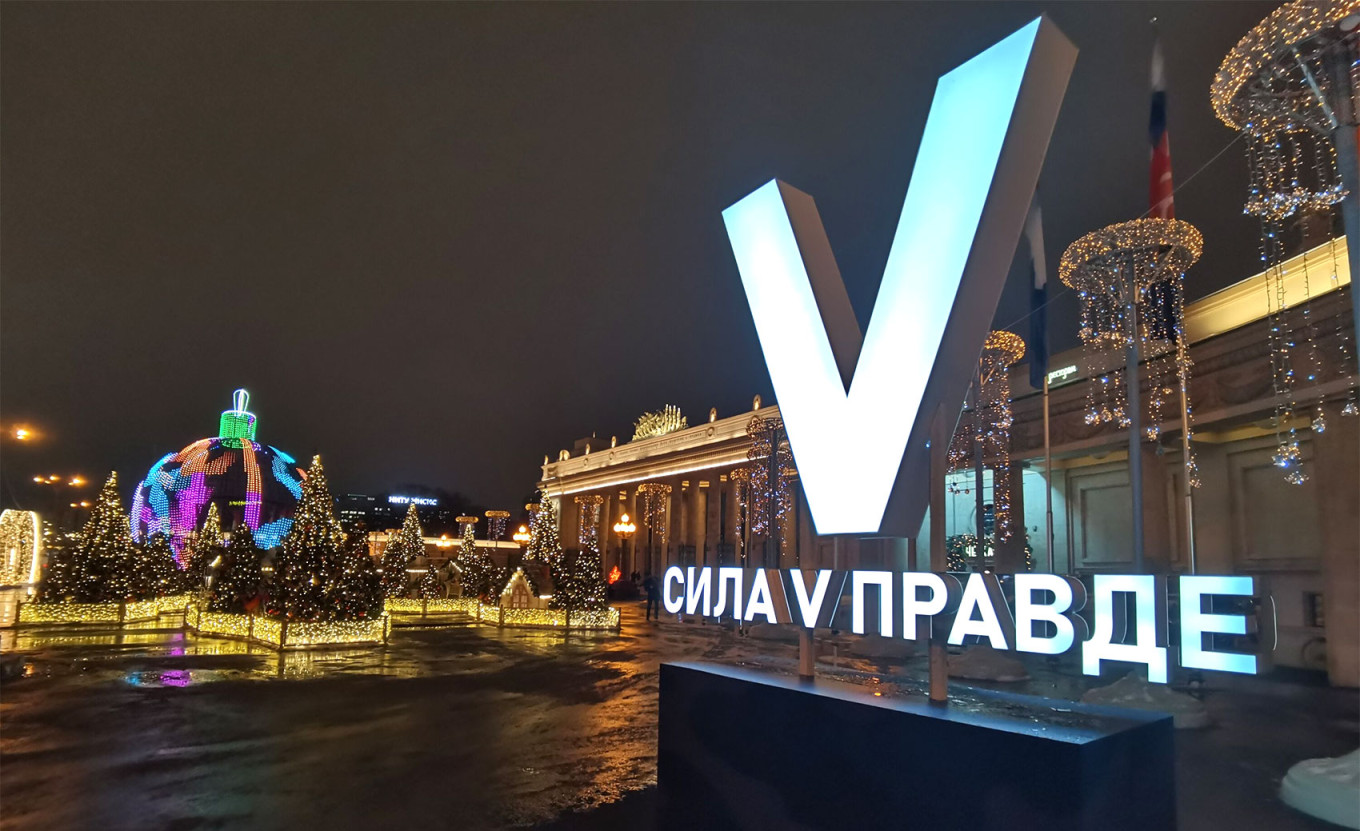
“There are burned buildings, abandoned stores and pharmacies — our commanders don’t really punish us for looting such places — and there is only one open store with an endless queue of soldiers and locals,” the officer said, describing the scene around him.
“I feel tension, grim determination and anger, but despite everything I do not regret that I came — I am here with my people to share their fate, whatever it may be,” he said.
“This is what my New Year mood is like.”
In the course of the almost 10-month war, the deaths of at least 10,000 Russian soldiers have been independently verified — with the real figure likely to be many times higher. U.S. officials have said they believe over 100,000 Russian military personnel have died.
Since September, several hundred thousand men have also been conscripted as part of Russia’s “partial” mobilization drive.
The war is even intruding on traditional New Year’s celebrations, with pro-war “Z” and “V” symbols added to festive street decorations in Moscow and Chelyabinsk in the Urals. Meanwhile, local authorities in the Siberian city of Chita erected ice sculptures of soldiers.
Russian war correspondents and soldiers are expected to appear on Russia's popular New Year's Eve television show ahead of President Vladimir Putin's traditional midnight speech.
Nevertheless — despite a universally pro-war message on Russia’s airwaves, a political crackdown and the passage of draconian wartime censorship laws — many Russians continue to risk long jail sentences to express their opposition to the war.
At least 19,478 people were detained for protesting the war in 2022, according to the OVD-Info human rights monitoring group.
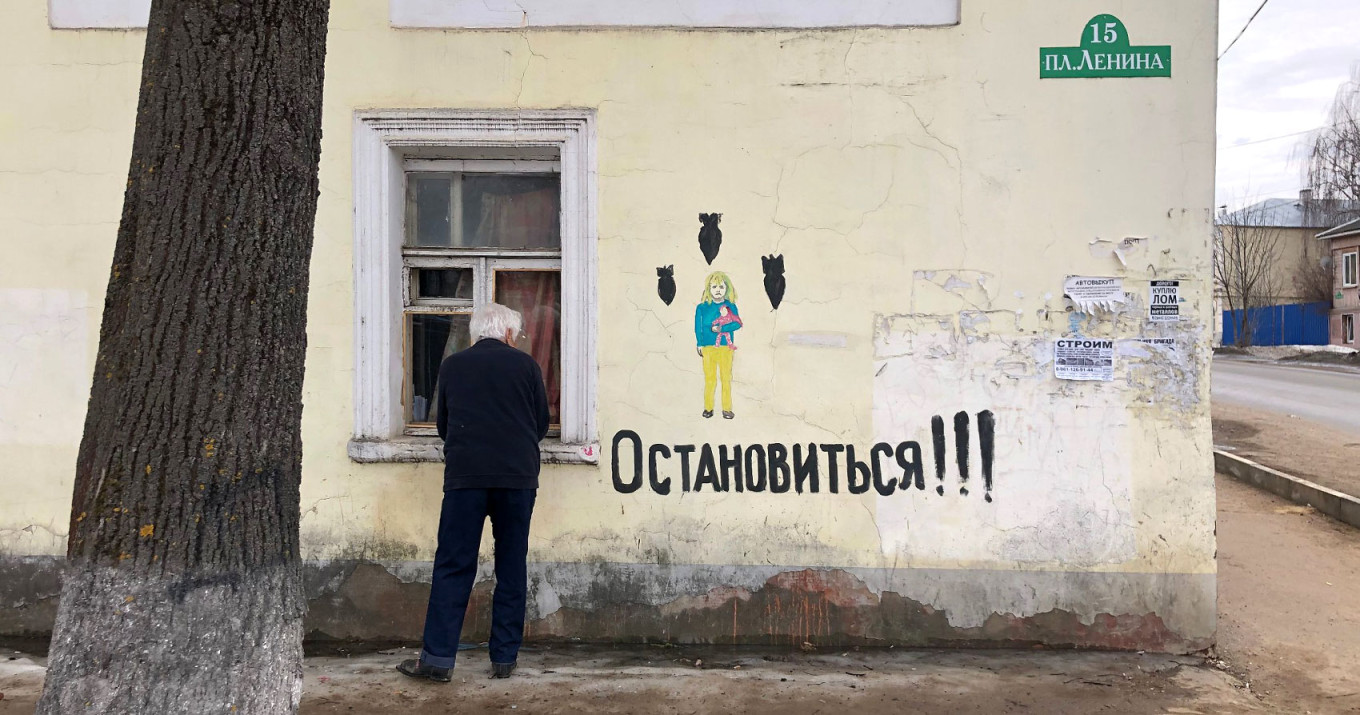
While Russian artist Vladimir Ovchinnikov, who has become well known for his anti-war murals painted in the streets of Borovsk, a provincial town 115 kilometers from Moscow, has not been arrested, he was ordered by a court to pay a 35,000 ruble ($498) fine for one piece of anti-war art he painted earlier this year.
“I consider [the war] a violation of all international norms — how can you attack a neighbor for no reason?” Ovchinnikov, 84, told The Moscow Times.
“How many more young people must be killed to remember that a bad peace is better than a good war? People in Russia used to say ‘peace to the world’ and ‘no to war’ but now such statements are punishable by law,” he said. “Where are we heading?”
While anti-war activists like Ovchinnikov remain in Russia, the start of the invasion and the country’s first mobilization since World War II led to an exodus of both those opposed to the regime and those seeking to avoid the draft.
In particular, former Soviet republics such as Georgia, Armenia, Kazakhstan and Kyrgyzstan have seen the arrival of tens of thousands of Russians.
“I no longer see myself living in Russia,” said Vitaly Kotsuba, a PR specialist who moved to neighboring Georgia after receiving a draft notice in September.
“I had a well-adjusted life before the mobilization — my job, friends and relatives. In Georgia, almost every night I wake up from nightmares about military commissars and border guards,” Kotsuba, 23, told The Moscow Times.
“Even if the war ends, its negative consequences will be felt for a long time — criminalization, economic recession, repressions. Of course, I dream of the war ending and of serious political changes, but I’m not counting on them.”
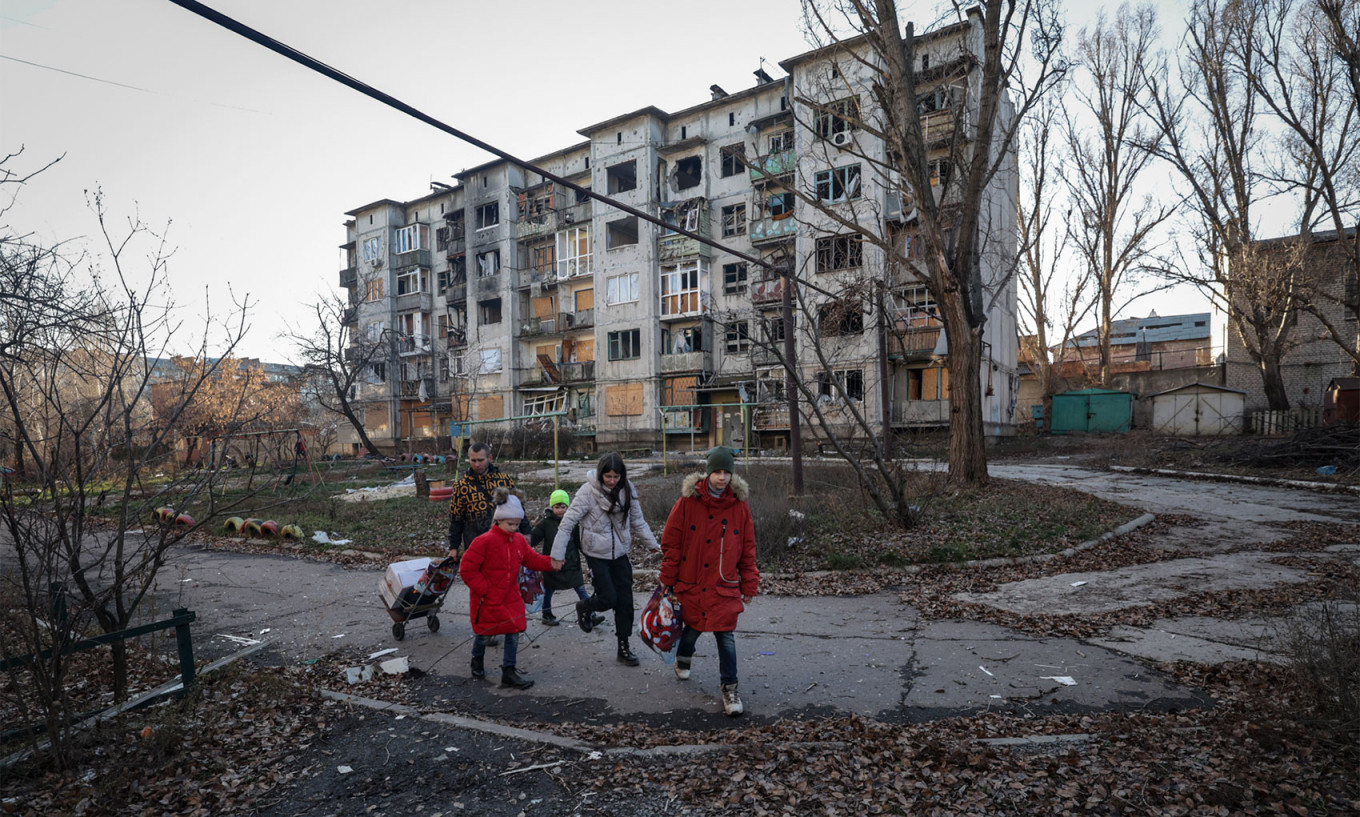
While most opinion polls suggest a large majority of Russians backed the invasion of Ukraine in February and support the Armed Forces, there is growing evidence attitudes could be evolving.
Alexander, who moved to the Russian city of Voronezh from Ukraine's Donetsk region in 2014, told The Moscow Times that his perception of the fighting in Ukraine has shifted — he previously supported pro-Russian separatists, but now he is against the war.
Donetsk was one of the Ukrainian regions illegally annexed by the Kremlin in September following staged referendums that were widely condemned by the international community.
“All this year I have been very worried about my relatives and friends who live in the [eastern Ukrainian area of] Donbas. Thank God that everyone is alive and well,” said Alexander, 29, who declined to provide his surname.
“I did not want this war, but it began. Perhaps my view is not popular, but I’m honest — I would not want my country to lose.”
Back in the small town of Borovsk, artist Ovchinnikov continues to play a cat-and-mouse game with the authorities who paint over his anti-war murals almost as soon as they are finished.
He believes his age has protected him, at least for the moment, from criminal charges.
“Even people who have fallen under the influence of deceitful propaganda want peace. I wish the people of Russia would switch on their brains and compassion. I wish Ukraine will someday be able to forgive such a betrayal,” Ovchinnikov said.
For 2023, Ovchinnikov’s wishes are simple.
“A year without a war is how I would like to see 2023,” he said, adding that — in the meantime – the “main thing is to remain human.”
A Message from The Moscow Times:
Dear readers,
We are facing unprecedented challenges. Russia's Prosecutor General's Office has designated The Moscow Times as an "undesirable" organization, criminalizing our work and putting our staff at risk of prosecution. This follows our earlier unjust labeling as a "foreign agent."
These actions are direct attempts to silence independent journalism in Russia. The authorities claim our work "discredits the decisions of the Russian leadership." We see things differently: we strive to provide accurate, unbiased reporting on Russia.
We, the journalists of The Moscow Times, refuse to be silenced. But to continue our work, we need your help.
Your support, no matter how small, makes a world of difference. If you can, please support us monthly starting from just $2. It's quick to set up, and every contribution makes a significant impact.
By supporting The Moscow Times, you're defending open, independent journalism in the face of repression. Thank you for standing with us.
Remind me later.



